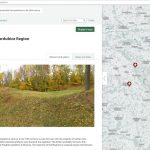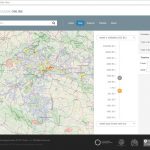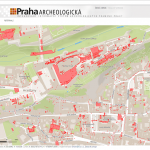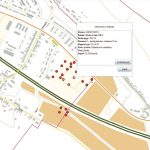AIS CR – website
Hosting institutions:
- Institute of Archaeology, Academy of Sciences of the Czech Republic, Brno
- Institute of Archaeology, Academy of Sciences of the Czech Republic, Prague
Although the field of archaeology in the Czech Republic generates large amounts of data, until recently the practitioners and academics have not had sufficient tools for a comprehensive analysis and assessment of that data that would also allow the management of data acquisition and quality control. Thanks to work carried out in recent years, various information systems dealing with archaeological fieldwork have been integrated into a single platform – the Archaeological Map of the Czech Republic – along with other services designed as part of the AIS CR research infrastructure. The long-term aim of AIS CR is to integrate a system of archaeological fieldwork administration with a database of fieldwork results and other information on archaeological heritage, while providing tools for making all of that information available to the public. As part of the process of developing this infrastructure, information on so far unarchived fieldwork results is collected, revised and/or edited in order to save this important data that would otherwise be irretrievably lost. Several substantial changes have been achieved through AIS CR, particularly with regard to archaeological fieldwork management and the recording of fieldwork results. These mainly concern (i) defining a dynamic information flow model for archaeological fieldwork; (ii) implementing persistent identifiers for archaeological fieldwork events, sites and all other objects in the information system (documents, bibliographies, geospatial units); (iii) assembling data from across the Czech Republic under a single data model and a unified digital environment; (iv) maximising data accessibility for both the professional and general public (regarding the latter, see the publication Archaeological Atlas of the CR and its website). Currently, basic information on all planned, ongoing and completed fieldwork projects/events and their results is being registered in the AIS CR databases. The AIS CR team is also involved in finishing the revision of existing datasets, retrospectively amending previously unrecorded information, incorporating data from field surveys (e.g. aerial archaeology) and creating new user services. Another priority is to increase the compatibility of AIS CR with other information resources (both national and international) and to strengthen international collaboration. In accordance with international standards, AIS CR ensures the compatibility of information and services, and is committed to furthering collaboration as part of existing and planned international projects and infrastructures (such as E-RIHS).
Future development
AIS CR plans to broaden its portfolio of publicly accessible digital services and databases of archaeological data. It is also committed to strengthening its position as a core research infrastructure that supports all areas, from day-to-day administration to research and education. A nation-wide archaeological information system with a public web interface is being developed. AIS CR managers (Institutes of Archaeology of the CAS) are currently agreeing on contracts with data producers (organisations licensed for archaeological fieldwork) to use AIS CR as one of the key tools for their projects. International partnerships will allow AIS CR to contribute to pan-European archaeological research infrastructures and initiatives. AIS CR will be a centrally provided public service that secures safe repositories of archaeological data. The focus will be on disseminating and using this information in a synergistic way to ensure accessibility for both lay and professional purposes.
Socio-economic impact
The work performed by AIS CR has been positively reflected in several areas: (i) scientific research; (ii) archaeological heritage management; (iii) public accessibility to Czech cultural heritage; (iv) spatial planning that helps construction and industrial developers save on costs (projects qualifying for archaeological intervention by law) and (v) technological progress under the framework of digital humanities. AIS CR provides its user community with a complex, interlinked and accessible set of information on archaeological heritage and the historical landscape, a digital archive of documents, access to maps, supplementary platforms for mining information and the presentation of data on archaeological resources in the CR. AIS CR serves not only the research community, but also administrative and commercial sectors and the general public, thus contributing to the strengthening of national and cultural identity and the preservation of national cultural values. It provides information on archaeological projects, fieldwork events and sites (project documentation, preliminary reports, site reports, photographs, maps, plans, expert reports, specialised metadata and more) and secure access to information required for archaeological fieldwork and research and education in historical disciplines. Both administration offices and archaeological institutions are provided with access to information on fieldwork and its results. Developers and investors can use AIS CR to predict the existence of archaeological sites in their areas of interest.



